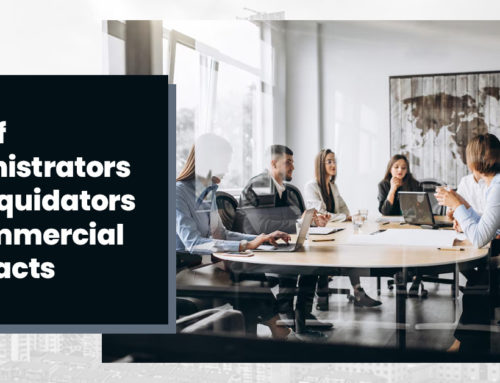When a company finds itself in financial trouble it can’t resolve, liquidation is often the best way forward. In basic terms, liquidation is a formal process that involves closing down the business and selling off its assets to pay as much of its debts as possible. Though it’s a tough decision, liquidation provides a clear and legal way for directors to manage unresolved financial issues and allow all parties to move on.
Liquidation involves many steps, including asset sales and paying creditors, which may leave those involved wondering what happens next. Here’s a breakdown of what to expect after liquidation for directors, employees, creditors, and future business ventures.
The liquidation process: what it means
Once liquidation begins, the company stops all trading activities. A licensed insolvency practitioner is appointed as the Liquidator and assumes responsibility for managing the company’s remaining affairs. Their role involves gathering and selling assets, paying off creditors in an organised manner, and eventually dissolving the company. This process can vary based on the type of liquidation, whether it’s a Creditors’ Voluntary Liquidation, a Compulsory Liquidation, or a Members’ Voluntary Liquidation for solvent companies.
The Liquidator oversees the process from start to finish, ensuring everything is handled fairly and legally. Selling off assets and paying creditors allows the business to wrap up its obligations before the company is formally dissolved and removed from the Companies House register. At that point, the company no longer exists as a legal entity.
What liquidation means for directors
For directors, liquidation is the formal end of their role with the company. However, their cooperation with the Liquidator remains essential throughout the process. Directors must hand over company records, assets, and any other necessary information, ensuring that the Liquidator can manage the company’s affairs effectively.
One common question is whether directors are personally liable for the company’s debts after liquidation. Typically, directors are not personally responsible unless they provide personal guarantees for certain debts, like loans or credit agreements. Additionally, if any wrongful trading or misconduct is found, a director could face consequences such as disqualification or personal liability.
Liquidation doesn’t mark the end of a director’s business career. Many directors move on to start new ventures, often bringing valuable lessons learned from their experiences. However, it’s worth noting that involvement in a liquidated company can impact creditworthiness, potentially making it more challenging to secure financing in the future.
Impact on employees
Unfortunately, liquidation usually means the end of employment for the company’s workforce. While employees face an unexpected change, they have access to certain financial protections to help manage the transition. In cases where the company cannot cover final wages, holiday pay, or redundancy, employees may be eligible to claim these payments from the government’s National Insurance Fund. The Liquidator helps guide employees through this process, ensuring they understand the steps required to access these funds.
Losing a job due to liquidation is understandably tough, but employees are typically not blamed for the company’s financial issues. Many find new employment with support from job placement services, bringing a sense of stability back into their lives relatively quickly.
How creditors are affected
Creditors are understandably concerned with the status of their outstanding debts when a company enters liquidation. In liquidation, creditors are paid according to a legally defined order of priority. Secured creditors, such as banks with collateral, are at the front of the line. They are followed by preferential creditors, including employees owed wages and pension contributions, with unsecured creditors coming next. While unsecured creditors may only receive a portion of what they’re owed, they still play a crucial role in the process, with Liquidators providing updates and working to ensure fair distribution of any remaining funds.
Throughout the process, the Liquidator stays in communication with creditors, keeping them informed about the progress and expected outcome. Creditors are also given the opportunity to submit claims and discuss any questions or concerns regarding the distribution of funds.
Life after liquidation
When a company closes, it can feel like an ending. However, for many directors, employees and creditors, it’s a step toward moving forward. Directors often use the experience to improve their financial planning and business management skills, learning from what led to the need for liquidation. For directors who move on to other ventures, insights gained from this process can contribute to building more resilient businesses.
For creditors, while they may not receive full repayment, a well-handled liquidation ensures transparency and fairness in addressing outstanding debts. This organised process provides creditors with clarity about their position, helping them manage their own financial affairs more effectively.
Liquidation is also a way for creditors and employees to move forward without lingering debts or obligations to a struggling business. Employees can focus on seeking new opportunities, knowing they’re entitled to financial protections. For some directors, the end of a company allows for personal and professional rebuilding and the chance to establish a solid foundation for future endeavours. With the experience and guidance of insolvency practitioners, the liquidation process can be managed smoothly, giving all parties a structured path through a challenging time.
For those contemplating liquidation, whether due to financial pressures or a need to close down a business legally and responsibly, the right support is essential. Our team of insolvency practitioners is here to offer straightforward, honest advice, providing directors with the guidance they need through each stage of liquidation. So, get in touch today to arrange a free initial consultation; we’re ready to answer questions and help determine the best path forward, allowing everyone involved to find the clarity and support they need to move ahead confidently.





